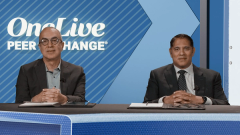
Ongoing Clinical Trials in the Metastatic CRPC Setting
Key opinion leaders in metastatic castration-resistant prostate cancer share insight to key ongoing clinical trials within the landscape.
Episodes in this series

Transcript:
Rana McKay, MD:There’s a series of other clinical trials in the mHSPC [metastatic hormone-sensitive prostate cancer] setting, from AMPLITUDE to CAPItello-281. What are your thoughts on those? How are those going to shake out? It’s going to throw a wrench into everything when those studies read out.
Arash Rezazadeh Kalebasty, MD:You’re right. We bring everything up. By the time the trials are done, everybody has seen everything, so you can’t even have that patient anymore. The data are useful to see how it’s working in that setting, but I don’t think the label is going to be that useful. Not many patients are left with that.
Rana McKay, MD:As these trials read out, we’re going to see more risk stratification in the metastatic hormone-sensitive setting. We’ve got TALAPRO-3 looking at enzalutamide and talazoparib for HRR-mutated patients. We’ve got CAPItello-281 looking at capivasertib in patients with PTEN loss by IHC [immunohistochemistry]. We’ve got PSMA [prostate-specific membrane antigen] addition looking at PSMA-positive disease. We’re starting to divide patients, but in a very asynchronous way. Tell me your thoughts.
Ulka Vaishampayan MD:First, we have to see efficacy. I have some skepticism around the CDK4/6. PSMA-lutetium will probably see the efficacy translate because that’s a relatively less of a selection. Only about 20% of patients don’t express adequate PSMA, and they got excluded from the VISION trial at least. There, the delayed toxicities and long-term issues become a concern. We’d need to be able to see that. If we’re prolonging survival, we absolutely should be vested in looking at the delayed toxicities.
Sumit K. Subudhi, MD, PhD:As we wait for the right molecular biomarkers to help us stratify these patients, we could go back to what Maha Hussain did with ADT plus flutamide. She was able to stratify by the absolute PSA [prostate-specific antigen] nadir at 7 months. We all agree that second-generation hormones are here to stay in the frontline setting. Maybe after 2 months, based on their PSA data, we can stratify patients into who needs to get a third therapy to escalate in. We need to think about things like that.
Rana McKay, MD:There have been a series of clinical trials that I hope we can move into biomarker strategies. We have to do that as a field, but it takes time to identify biomarkers that are validated. At ASCO [American Society of Clinical Oncology Annual Meeting], we saw a series of studies in the mCRPC [metastatic castration-resistant prostate cancer] setting reporting out novel agents, enzalutamide combined with a glucocorticoid receptor antagonist. Any thoughts? Excitement or not excitement? What do you all think?
Ulka Vaishampayan MD:That’s 1 of the validated pathways of resistance to enzalutamide. I like that path. Maybe that will delay resistance and how much we can optimize the androgen receptor inhibitor therapy. If it helps us do that and prolongs it by another year, that’s a big win.
Sumit K. Subudhi, MD, PhD:I agree. The biology is very clear. This was a rationally designed combination as opposed to almost everyone who adds PD-1 to everything. It would be nice to see if it’s active.
Rana McKay, MD:Exactly. A lot of drugs are being developed to continue to target the AR pathway in mCRPC from the AR degraders and the ligand-binding, domain-targeting agents. You’ve even got your ODM-208, which is targeting much higher up in the pathway. That’s entering phase 3 as well.
Ulka Vaishampayan MD:That’s another 1 that shows the microenvironment is important and targets that. AR degraders also are showing a lot of promise.
Arash Rezazadeh Kalebasty, MD:About the glucocorticoid receptor blockage, I’m surprised by the safety. It could have been much more toxic, but it wasn’t. The efficacy wasn’t great, but keep in mind that these patients have many lines of therapy. If you get the safety right, then maybe you can test it in the right setting, but not in heavily pretreated patients who have other mechanisms of resistance.
Rana McKay, MD:Scott, you had been working on J591. Is that right?
Scott Tagawa, MD, MS, FACP:Yes, J591 is the antibody that Neil Bander invented decades ago. It’s in many different formats now. It has been in several ADCs [antibody-drug conjugates]. With lutetium on it, it’s called TLX591 in the ProstACT trial. There’s CONV-01-⍺ and actinium-225–J591 with Convergent [Therapeutics]. There are multiple forms of that antibody, either radiolabeled or as an antibody-drug conjugate.
Rana McKay, MD:What do you think? Is it going to move forward?
Scott Tagawa, MD, MS, FACP:It’s clear if we do nothing else than look at the PET [positron emission tomography] images. There’s a different biodistribution with the antibody and the small molecule. With smaller molecules you’ll see the gut light up in the kidney, and you don’t with the antibody. That’s likely most important as we come in with something very potent, like an alpha emitter. We talked about the interaction with the antibody, even with nothing on it, which makes this small molecule stay in. It looks across a number of data sets, at the PSMA PETs with small molecules. The bones don’t light up as much. In the tumor dosimetry poster presentation at ASCO, the SUV [standard uptake value] max was lower compared with other things. It’s all in line with a higher-flow area with smaller-volume disease and a higher surface area. But if there’s not a neighboring PSMA-positive cell to take up, so it washes away. The antibody alone could help the radioligands, otherwise it’s just another delivery agent. There’s J591 in the backbone for the … CAR [chimeric antigen receptor] T cells and antibody-drug conjugates.
Transcript edited for clarity.







































